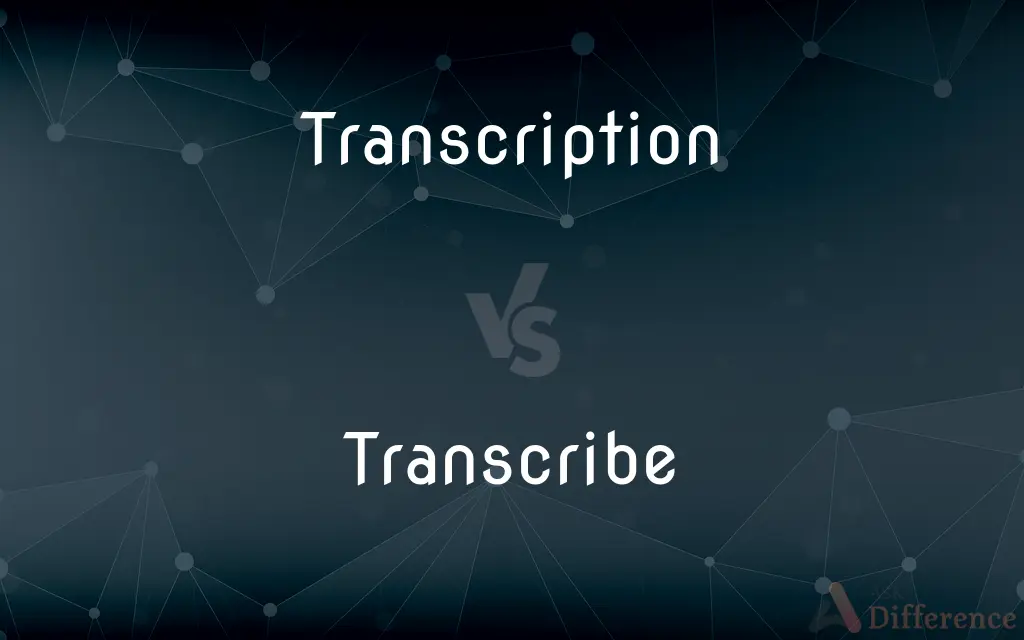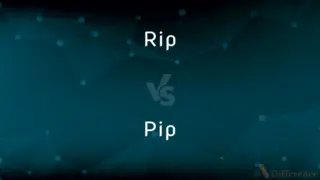Transcription vs. Transcribe — What's the Difference?
By Urooj Arif & Fiza Rafique — Updated on April 20, 2024
Transcription is the process of converting spoken language into written text, while transcribe is the verb form, meaning to perform that conversion.

Difference Between Transcription and Transcribe
Table of Contents
ADVERTISEMENT
Key Differences
Transcription refers to the overall process or result of converting audio into text. On the other hand, transcribe is the action taken by an individual or software to make that conversion.
One engages in transcription when they need a written record of spoken content, such as in legal, medical, or media contexts, whereas to transcribe is to actively listen to speech and convert it into written form.
Transcription can be performed manually by a person or automatically by software, emphasizing the broad applications and tools involved. Conversely, when someone transcribes, they might use tools like headphones, software, or a transcription pedal to aid in accuracy and speed.
The quality and accuracy of transcription depend on factors like the clarity of the audio and the skill of the transcriber, while the act of transcribing requires attention to detail and often a good grasp of language to ensure precision.
Transcription services may include additional features like timestamps and speaker identification, which are not directly implied by the verb transcribe, indicating that the noun encompasses a wider scope of service features.
ADVERTISEMENT
Comparison Chart
Definition
The process or result of converting spoken language into text
The action of converting spoken language into text
Usage
Noun
Verb
Contexts
Legal, medical, media, etc.
Any context where audio needs to be written down
Tools & Equipment
May involve software, transcription pedals, etc.
Often involves using headphones, software, foot pedals
Related Features
May include timestamps, speaker identification
Focuses solely on the conversion process
Compare with Definitions
Transcription
The process of DNA being copied to mRNA in a cell.
Transcription in the nucleus is the first step of gene expression.
Transcribe
To convert spoken language into written text by listening.
Volunteers were needed to transcribe lectures for archival purposes.
Transcription
A transcript, especially one made from a recording.
The court ordered a full transcription of the proceedings.
Transcribe
To write out or put into written form.
He transcribes his thoughts into his journal every evening.
Transcription
The adaptation of a composition for a medium different from that for which it was originally written.
His transcription of the symphony for solo piano was acclaimed.
Transcribe
To make a transcription of music or other audio.
The musician transcribed the folk song for piano.
Transcription
The written or printed representation of something.
The transcription of the interview took three hours.
Transcribe
To represent (speech sounds) by phonetic symbols.
The linguist transcribed the unfamiliar sounds accurately.
Transcription
The act of making a record (especially an audio record);
She watched the recording from a sound-proof booth
Transcribe
To make a written copy, particularly from one medium to another.
She had to transcribe the audio recordings to text by tomorrow.
Transcription
The act or process of transcribing.
Transcribe
To make a full written or typewritten copy of (dictated material, for example).
Transcription
(Music) An adaptation of a composition.
Transcribe
(Computers) To transfer (information) from one recording and storing system to another.
Transcription
A recorded radio or television program.
Transcribe
To adapt or arrange (a composition) for a voice or instrument other than the original.
Transcription
(Linguistics) A representation of speech sounds in phonetic symbols.
Transcribe
To translate (a composition) from one notational system to another.
Transcription
(Genetics) The synthesis of messenger RNA from a DNA template through the formation of base pairs, resulting in a transfer of genetic information that codes for amino acid sequences composing proteins.
Transcribe
To reduce (live or recorded music) to notation.
Transcription
The act or process of transcribing.
Transcribe
To record, usually on tape, for broadcast at a later date.
Transcription
Something that has been transcribed, including:
Transcribe
(Linguistics) To represent (speech sounds) by phonetic symbols.
Transcription
(music) An adaptation of a composition.
These frame tale interludes frequently include transcriptions of Italian folk songs.
Transcribe
To translate or transliterate.
Transcription
(broadcasting) A recorded radio or television programme.
Transcribe
(Biology) To cause (DNA) to undergo transcription.
Transcription
(linguistics) A representation of speech sounds as phonetic symbols.
Transcribe
To convert a representation of language, typically speech but also sign language, etc., to a written representation of it. The term now usually implies the conversion of speech to text by a human transcriptionist with the assistance of a computer for word processing and sometimes also for speech recognition, the process of a computer interpreting speech and converting it to text.
Transcription
(obsolete) A written document.
Transcribe
(dictation) To make such a conversion from live or recorded speech to text.
The doctor made several recordings today which she will transcribe into medical reports tomorrow.
Transcription
(genetics) The synthesis of RNA under the direction of DNA.
Transcribe
(computing) To transfer data from one recording medium to another.
Transcription
The act or process of transcribing, or copying; as, corruptions creep into books by repeated transcriptions.
Transcribe
(music) To adapt a composition for a voice or instrument other than the original; to notate live or recorded music.
Transcription
A copy; a transcript.
Transcribe
(biochemistry) To cause DNA to undergo transcription.
Transcription
An arrangement of a composition for some other instrument or voice than that for which it was originally written, as the translating of a song, a vocal or instrumental quartet, or even an orchestral work, into a piece for the piano; an adaptation; an arrangement; - a name applied by modern composers for the piano to a more or less fanciful and ornate reproduction on their own instrument of a song or other piece not originally intended for it; as, Liszt's transcriptions of songs by Schubert.
Transcribe
(linguistics) To represent speech by phonetic symbols.
Transcription
Something written, especially copied from one medium to another, as a typewritten version of dictation
Transcribe
To write over again, or in the same words; to copy; as, to transcribe Livy or Tacitus; to transcribe a letter.
Transcription
(genetics) the organic process whereby the DNA sequence in a gene is copied into mRNA; the process whereby a base sequence of messenger RNA is synthesized on a template of complementary DNA
Transcribe
Write out from speech, notes, etc.;
Transcribe the oral history of this tribe
Transcription
A sound or television recording (e.g., from a broadcast to a tape recording)
Transcribe
Rewrite in a different script;
The Sanskrit text had to be transliterated
Transcription
The act of arranging and adapting a piece of music
Transcribe
Rewrite or arrange a piece of music for an instrument or medium other than that originally intended
Transcribe
Make a phonetic transcription of;
The anthropologist transcribed the sentences of the native informant
Transcribe
Convert the genetic information in (a strand of DNA) into a strand of RNA, especially messenger RNA
Common Curiosities
Can transcription be automated?
Yes, transcription can be automated using software that converts speech to text using AI technologies.
What does it mean to transcribe?
To transcribe means to actively convert audio content into text.
How are transcription and transcribe related?
Transcription is the noun describing the process, while transcribe is the verb describing the action of executing that process.
Why is accurate transcription important?
Accurate transcription ensures that the written records reflect the original spoken content faithfully, which is crucial for legal accuracy and information dissemination.
Is transcribing difficult?
Transcribing can be challenging due to factors like poor audio quality, fast speech, and technical or specialized language.
Are transcriptions verbatim?
Transcriptions can be verbatim, including all words and non-verbal sounds, or edited for clarity and brevity.
What tools are used to transcribe?
Tools such as transcription software, headphones, and foot pedals are commonly used in transcribing.
How long does transcription take?
The time it takes to transcribe audio can vary widely based on the length and clarity of the recording and the experience of the transcriber.
What is transcription?
Transcription is the process of converting spoken words into written text.
What are common fields where transcription is used?
Common fields include legal, medical, journalism, and research.
Share Your Discovery

Previous Comparison
Furniture vs. Furnishings
Next Comparison
Rip vs. PipAuthor Spotlight
Written by
Urooj ArifUrooj is a skilled content writer at Ask Difference, known for her exceptional ability to simplify complex topics into engaging and informative content. With a passion for research and a flair for clear, concise writing, she consistently delivers articles that resonate with our diverse audience.
Co-written by
Fiza RafiqueFiza Rafique is a skilled content writer at AskDifference.com, where she meticulously refines and enhances written pieces. Drawing from her vast editorial expertise, Fiza ensures clarity, accuracy, and precision in every article. Passionate about language, she continually seeks to elevate the quality of content for readers worldwide.














































